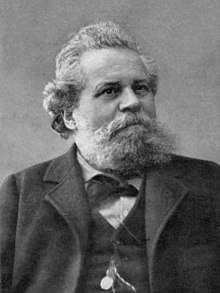Giosue Carducci
| Giosuè Carducci | |
|---|---|
 |
|
| Born | Giosuè Alessandro Giuseppe Carducci 27 July 1835 Valdicastello di Pietrasanta, Tuscany, Italy |
| Died | 16 February 1907 (aged 71) Bologna, Italy |
| Occupation | Poet |
| Nationality | Italian |
| Notable awards |
Nobel Prize in Literature 1906 |
Giosuè Alessandro Giuseppe Carducci (Italian: [dʒozuˈɛ kkarˈduttʃi]; 27 July 1835 – 16 February 1907) was an Italian poet and teacher. He was very influential and was regarded as the official national poet of modern Italy. In 1906 he became the first Italian to receive the Nobel Prize in Literature "not only in consideration of his deep learning and critical research, but above all as a tribute to the creative energy, freshness of style, and lyrical force which characterize his poetic masterpieces".
He was born in Valdicastello (part of Pietrasanta), a small town in the Province of Lucca in the northwest corner of the region of Tuscany. His father, a doctor, was an advocate of the unification of Italy and was involved with the Carbonari. Because of his politics, the family was forced to move several times during Carducci's childhood, eventually settling for a few years in Florence.
From the time he was in college, he was fascinated with the restrained style of Greek and Roman antiquity, and his mature work reflects a restrained classical style, often using the classical meters of such Latin poets as Horace and Virgil. He translated Book 9 of Homer's Iliad into Italian.
He graduated in 1856 from the Scuola Normale Superiore di Pisa and began teaching school. The following year, he published his first collection of poems, Rime. These were difficult years for Carducci: his father died, and his brother committed suicide.
In 1859, he married Elvira Menicucci, and they had four children. He briefly taught Greek at a high school in Pistoia, and then was appointed Italian professor at the university in Bologna. Here, one of his students was Giovanni Pascoli, who became a poet himself and later succeeded him at the university.
Carducci was a popular lecturer and a fierce critic of literature and society. He was an atheist, whose political views were vehemently hostile to Christianity generally and the Catholic Church in particular.
...
Wikipedia
